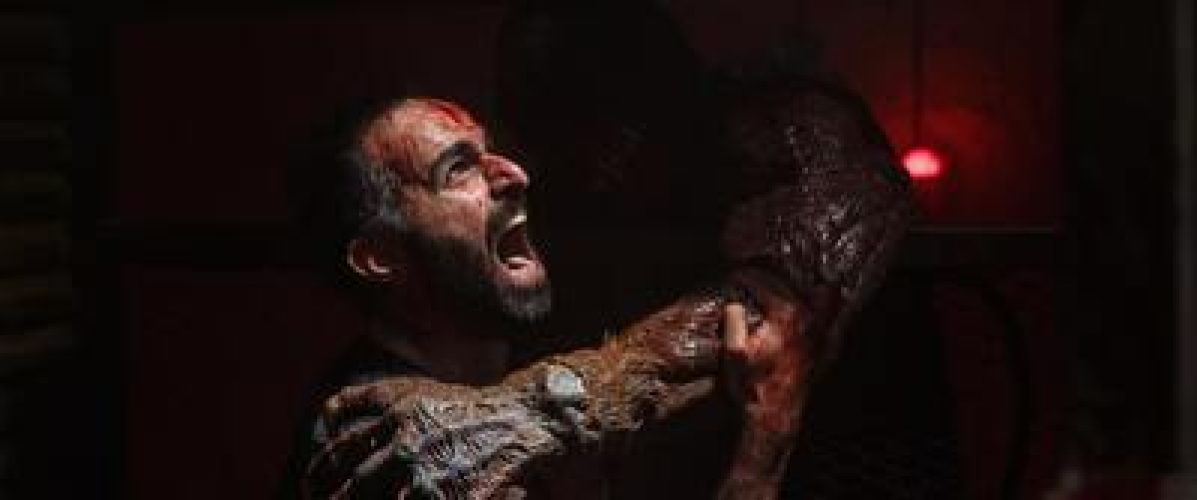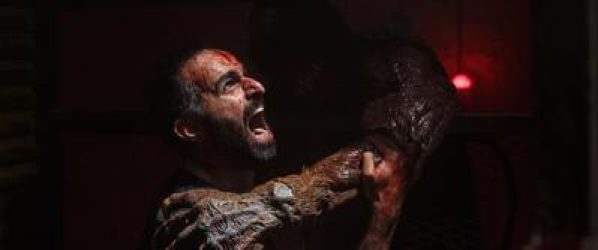Fans of B-movies, rubber monsters, and back issues of Weird War Tales will want to check out “The Lair,” a good enough horror/action hybrid that sics a ravenous monster on a group of British and American soldiers stationed in modern-day Afghanistan.
“The Lair” checks off some genre fans’ qualitative boxes, thanks in part to co-writer/director Neil Marshall’s knack for top-this violence, post-spaghetti-western war movie repartee, and general eye for action filmmaking, from choreography to mood lighting. There’s also some tinny dialogue and wooden performances throughout, and some creaky scenes featuring an indistinct group of hostile Afghani soldiers. Thankfully, what Marshall (“The Descent,” “The Reckoning”) and his co-writer/star/wife Charlotte Kirk get right here matters more than what they don’t, especially with regard to one surprisingly compelling supporting performance.
“The Lair” kicks off with its most eye-catching and dramatically urgent scenes: scrappy Royal Air Force Captain Sinclair (Kirk) is quickly shot out of the sky by Afghan fighters, without warning or unnecessary narrative throat-clearing. A fellow RAF man, Johnson (Alex Morgan), dies while trying to save Sinclair. “Sorry …” he says before a short pause. “For the inconvenience.”
Sinclair then flees from her attackers into an abandoned bunker, which contains the toothy monster that’s understandably all over this movie’s posters and advertising. It’s a neat-looking monster, even if it doesn’t look like it cost an arm and a leg (in real life), and was also maybe the product of Russian experimentation (in the movie), since the bunker it escaped from features some decorative Cyrillic warnings. Of particular note: “Do not open.”
Sinclair doesn’t read or speak Russian, but Kabir (Hadi Khanjanpour), a sympathetic Afghani soldier, does. He tags along with Sinclair to a nearby military base, where their respective wounds are tended to and some perfunctory getting-to-know-you information is exchanged. Sinclair also tries to warn Major Roy Finch (Jamie Bamber) and his group of disaffected stock types, like Everett (Mark Arends), the rookie, and Lafayette (Kibong Tanji), the klepto.
But Finch and his squad, which also includes three Brits led by the unflappable Sergeant Oswald Jones (Leon Ockeden), don’t believe in monsters, and also don’t know anything about the Russian base that Sinclair’s just escaped. Maybe she hallucinated it all? Kabir disagrees and in a short amount of time, so does the monster, who descends on Finch’s group and makes short work of them. Meanwhile, the surrounding Afghani soldiers are still armed, nearby, and unhappy.
Much of your enjoyment of “The Lair” depends on how you feel about its performances and dialogue, since so much of the movie repeats the same war and horror movie clichés that were already rote by the time that John Carpenter and company messed around with them in both “Assault on Precinct 13” and “The Thing.” Sinclair even refers to Finch’s group as “The Dirty Dozen” and his outpost is marked by a chintzy-looking sign that reads: “Welcome to Fort Apache.” These callbacks are not necessarily mood-killers, but Kirk’s indifferent line delivery and the sign’s setup-as-punchline presentation might be. And as far as zingers go, “Batter up, you son of a bitch,” (spoken by Finch) isn’t praiseworthy or lamentable.
Really, the movie’s performances are the biggest potential roadblock since so much about “The Lair” is, by now, rather old hat, as Marshall and genre buffs know. (“Dog Soldiers” fans should definitely seek out “The Lair.”) But the action filmmaking, from interstitial chases to fight choreography, looks good, and so does the monster and its practically-effected victims.
Most of Marshall’s ensemble cast members hit their marks hard enough. There’s a difference between unpolished and bad acting, and Khanjanpour proves it with his brittle, but resonant turn as Kabir. Khanjanpour makes you believe that there’s a frightened and resolute person behind even a pandering howler like, “That was some f**ked up sh*t!” I believed Khanjanpour as long as he was on-screen, and that goes a long way in a movie where an outsider like Kabir must establish the human stakes of this otherwise familiar genre exercise.
Now playing in theaters.
Fans of B-movies, rubber monsters, and back issues of Weird War Tales will want to check out “The Lair,” a good enough horror/action hybrid that sics a ravenous monster on a group of British and American soldiers stationed in modern-day Afghanistan. “The Lair” checks off some genre fans’ qualitative boxes, thanks in part to co-writer/director Neil Marshall’s knack for top-this violence, post-spaghetti-western war movie repartee, and general eye for action filmmaking, from choreography to mood lighting. There’s also some tinny dialogue and wooden performances throughout, and some creaky scenes featuring an indistinct group of hostile Afghani soldiers. Thankfully, what Marshall (“The Descent,” “The Reckoning”) and his co-writer/star/wife Charlotte Kirk get right here matters more than what they don’t, especially with regard to one surprisingly compelling supporting performance. “The Lair” kicks off with its most eye-catching and dramatically urgent scenes: scrappy Royal Air Force Captain Sinclair (Kirk) is quickly shot out of the sky by Afghan fighters, without warning or unnecessary narrative throat-clearing. A fellow RAF man, Johnson (Alex Morgan), dies while trying to save Sinclair. “Sorry …” he says before a short pause. “For the inconvenience.” Sinclair then flees from her attackers into an abandoned bunker, which contains the toothy monster that’s understandably all over this movie’s posters and advertising. It’s a neat-looking monster, even if it doesn’t look like it cost an arm and a leg (in real life), and was also maybe the product of Russian experimentation (in the movie), since the bunker it escaped from features some decorative Cyrillic warnings. Of particular note: “Do not open.” Sinclair doesn’t read or speak Russian, but Kabir (Hadi Khanjanpour), a sympathetic Afghani soldier, does. He tags along with Sinclair to a nearby military base, where their respective wounds are tended to and some perfunctory getting-to-know-you information is exchanged. Sinclair also tries to warn Major Roy Finch (Jamie Bamber) and his group of disaffected stock types, like Everett (Mark Arends), the rookie, and Lafayette (Kibong Tanji), the klepto. But Finch and his squad, which also includes three Brits led by the unflappable Sergeant Oswald Jones (Leon Ockeden), don’t believe in monsters, and also don’t know anything about the Russian base that Sinclair’s just escaped. Maybe she hallucinated it all? Kabir disagrees and in a short amount of time, so does the monster, who descends on Finch’s group and makes short work of them. Meanwhile, the surrounding Afghani soldiers are still armed, nearby, and unhappy. Much of your enjoyment of “The Lair” depends on how you feel about its performances and dialogue, since so much of the movie repeats the same war and horror movie clichés that were already rote by the time that John Carpenter and company messed around with them in both “Assault on Precinct 13” and “The Thing.” Sinclair even refers to Finch’s group as “The Dirty Dozen” and his outpost is marked by a chintzy-looking sign that reads: “Welcome to Fort Apache.” These callbacks are not necessarily mood-killers, but Kirk’s indifferent line delivery and the sign’s setup-as-punchline presentation might be. And as far as zingers go, “Batter up, you son of a bitch,” (spoken by Finch) isn’t praiseworthy or lamentable. Really, the movie’s performances are the biggest potential roadblock since so much about “The Lair” is, by now, rather old hat, as Marshall and genre buffs know. (“Dog Soldiers” fans should definitely seek out “The Lair.”) But the action filmmaking, from interstitial chases to fight choreography, looks good, and so does the monster and its practically-effected victims. Most of Marshall’s ensemble cast members hit their marks hard enough. There’s a difference between unpolished and bad acting, and Khanjanpour proves it with his brittle, but resonant turn as Kabir. Khanjanpour makes you believe that there’s a frightened and resolute person behind even a pandering howler like, “That was some f**ked up sh*t!” I believed Khanjanpour as long as he was on-screen, and that goes a long way in a movie where an outsider like Kabir must establish the human stakes of this otherwise familiar genre exercise. Now playing in theaters. Read More


